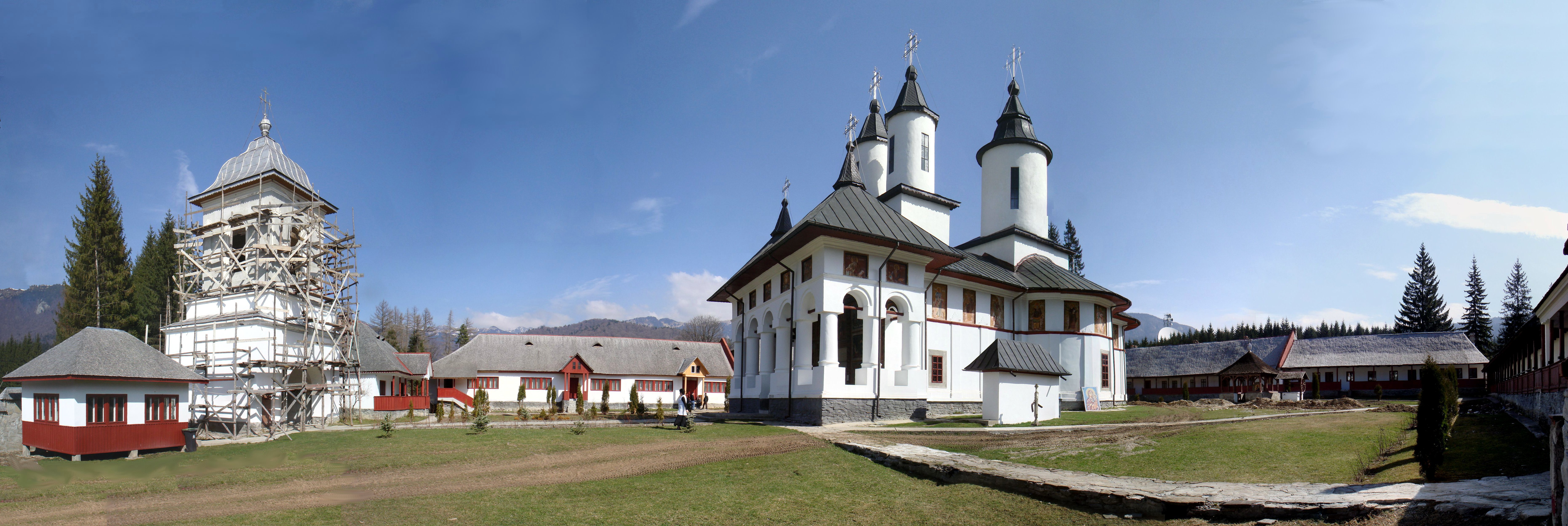Cheia Monastery on:
[Wikipedia]
[Google]
[Amazon]
Cheia Monastery ( ro, Mănăstirea Cheia) — a
 Buildings and structures completed in 1839
Romanian Orthodox monasteries of Prahova County
Historic monuments in Prahova County
{{Romania-EO-church-stub
Buildings and structures completed in 1839
Romanian Orthodox monasteries of Prahova County
Historic monuments in Prahova County
{{Romania-EO-church-stub
Romanian Orthodox
The Romanian Orthodox Church (ROC; ro, Biserica Ortodoxă Română, ), or Patriarchate of Romania, is an autocephalous Eastern Orthodox church in full communion with other Eastern Orthodox Christian churches, and one of the nine patriarchate ...
complex located on the right bank of Tâmpa Creek, southeast of Cheia
Cheia is a mountain resort, north of Ploiești in Prahova County, Romania. Situated in the Teleajen Valley, it is surrounded by the Ciucaș Mountains
The Ciucaș Mountains ( ro, Munții Ciucaș, hu, Csukás-hegység) is a mountain range in R ...
village (itself part of Măneciu commune), in Prahova County
Prahova County () is a county (județ) of Romania, in the historical region Muntenia, with the capital city at Ploiești.
Demographics
In 2011, it had a population of 762,886 and the population density was 161/km². It is Romania's third most ...
, Wallachia
Wallachia or Walachia (; ro, Țara Românească, lit=The Romanian Land' or 'The Romanian Country, ; archaic: ', Romanian Cyrillic alphabet: ) is a historical and geographical region of Romania. It is situated north of the Lower Danube and s ...
region, southeastern Romania. The monastery of monks was dedicated to the Holy Trinity
The Christian doctrine of the Trinity (, from 'threefold') is the central dogma concerning the nature of God in most Christian churches, which defines one God existing in three coequal, coeternal, consubstantial divine persons: God the ...
.
History
Cheia Monastery was originally built out of wood, in 1770. It was destroyed by theOttomans
The Ottoman Turks ( tr, Osmanlı Türkleri), were the Turkic founding and sociopolitically the most dominant ethnic group of the Ottoman Empire ( 1299/1302–1922).
Reliable information about the early history of Ottoman Turks remains scarce, ...
in 1777. A new wooden church was built in the early 1800s, but it was ravaged by fire 30 years later. The current monastery church was built of stone between 1835 and 1839. The murals were painted by Gheorghe Tattarescu
Gheorghe Tattarescu (; October 1818 – October 24, 1894) was a Moldavia
Moldavia ( ro, Moldova, or , literally "The Country of Moldavia"; in Romanian Cyrillic: or ; chu, Землѧ Молдавскаѧ; el, Ἡγεμονία τ� ...
in 1837.
The monastery suffered during World War I
World War I (28 July 1914 11 November 1918), often abbreviated as WWI, was List of wars and anthropogenic disasters by death toll, one of the deadliest global conflicts in history. Belligerents included much of Europe, the Russian Empire, ...
, when German troops occupied the grounds and destroyed some of the buildings. In 1950, the Communist authorities forced the bishop of Oradea
Oradea (, , ; german: Großwardein ; hu, Nagyvárad ) is a city in Romania, located in Crișana, a sub-region of Transylvania. The seat of Bihor County, Oradea is one of the most important economic, social and cultural centers in the western par ...
, into exile at Cheia Monastery, where he died in 1960.
References
External links
* Buildings and structures completed in 1839
Romanian Orthodox monasteries of Prahova County
Historic monuments in Prahova County
{{Romania-EO-church-stub
Buildings and structures completed in 1839
Romanian Orthodox monasteries of Prahova County
Historic monuments in Prahova County
{{Romania-EO-church-stub